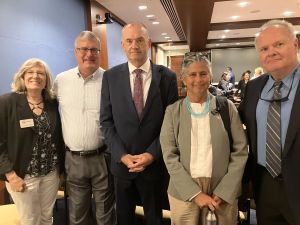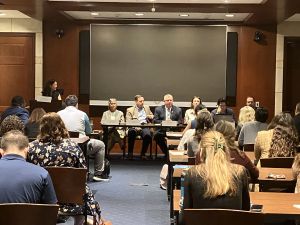USCC Staff and LEAC Members Attend Congressional PFAS Passive Receivers Briefing
Print this Article | Send to Colleague
On Wednesday, June 18th, more than 50 House and Senate Staff attended a hearing on the dangers of treating compost manufacturers and other "passive receivers" as polluters for the unintended entry of minute levels of PFAS in our operations. Per- and polyfluoroalkyl substances (known variously as PFAS, PFOs, and PFOAs) are a category of synthetic forever chemicals utilized for their grease- and water-repelling properties. In recent decades they have become ubiquitous in our environment, primarily through contamination from industrial production. They are found in many common household products, including raincoats, nonstick pans, cosmetics, and carpets. PFAS leach off of these products and enter our environment through water, soil, plants, and animals; they make their way into compost through many mediums, including contaminated food, water, biosolids, and, primarily, food packaging.
Due to concerns about plant and animal uptake of PFAS, attention surrounding PFAS has been––unfairly––directed toward composters and other passive receiver industries, including wastewater treatment, drinking water, and solid waste. These essential public service industries do not generate PFAS but rather receive them in the media that they manage to protect human health and the environment.
The Congressional Briefing, led by a multi-industry group called the Passive Receivers Coalition and attended by USCC’s Executive Director Linda Norris-Waldt and Director of Public Policy Chris Snow, detailed the dangers of targeting passive receivers in PFAS legislation. In addition to passive receiver industry members, perspectives were heard from researchers, local governments, and public works departments.

Congressional staffers’ questions were answered by a panel of experts that included: Anne Germain, Chief of Technical & Regulatory Affairs, National Waste & Recycling Association (Moderator); Sally Brown, Research Professor, College of the Environment, University of Washington; Chris Ball, Vice President, Environmental, Health and Safety, WM; Jeff Wilkerson, Director of Public Works, City of Martinsburg, West Virginia; Jason Dadakis, Executive Director, Water Quality and Technical Resources, Orange County Water District, California; Amanda Waters, General Counsel and Deputy General Manager, AlexRenew, Alexandria, Virginia; and Nick Rodricks, Chief, Bureau of Solid Waste Management, Baltimore County, Maryland. Pictured right, from right to left: Linda Norris-Waldt, Layne Baroldi, Noel Lyons, Sally Brown, and Chris Snow.
The briefing also addressed the EPA’s ruling to designate PFAS as Hazardous Substances under the Comprehensive Environmental Response, Compensation, and Liability Act (CERCLA), also known as the “Superfund Law,” which exposes passive receivers to newfound legal liability. CERCLA exposes passive receivers to retroactive, joint and several, and strict liability—even when they complied with all laws and had no role in the contamination. This designation effectively shifts CERCLA’s “polluter pays” model to a “community pays” model. USCC and the Passive Receivers Coalition are actively working with the EPA to establish a path forward where the polluter pays and passive receivers are protected.
Legislation that treats compost as a source of PFAS puts one of our most important tools for combating climate change at risk. PFAS legislation must target the manufacturers of products that contain PFAS, as articulated eloquently by Dr. Sally Brown of the University of Washington during this hearing. USCC's Deputy Director Linda Norris-Waldt, CAE, and Director of Public Policy Chris Snow both attended the hearing to show the USCC's continuing commitment to defend compost manufacturers as passive receivers of PFAS and push for legislation that targets the sources of PFAS themselves. The USCC believes that any laws surrounding PFAS need to directly target the sources of PFAS themselves and actively protect passive receivers from legal action.


